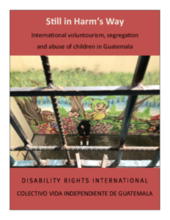This report from Disability Rights International documents the human rights violations, exploitation, and trafficking of children with and without disabilities in Guatemala. Guatemala has failed to create the protections and support needed to help children live with a family – especially children with disabilities. DRI is also concerned that private charities and international donors are supporting orphanages and perpetuating discrimination. International support – including “voluntourism” – leaves children open to segregation, abuse, and further exploitation by traffickers.
A year after the fire tragedy at the Hogar Seguro Virgen de la Asunción orphanage, DRI has found that the survivors of Hogar Seguro – and children confined to institutions throughout Guatemala – are still living in harm’s way. Instead of investing in supports to protect families, Guatemala is doing the opposite – building new institutions to confine children. In addition, Guatemala has provided no public accounting for the whereabouts of hundreds of missing children following the chaos of the fire – who we suspect may have been trafficked into the sex industry.
Over the last year, DRI has conducted a broader investigation into children in Guatemala’s orphanages. The country’s child welfare system is built on a system of orphanages and institutions that separates children from their families and leaves them open to abuse and neglect. DRI’s investigation shows that conditions for children with disabilities are particularly dangerous. Children with disabilities who grow up in orphanages will likely remain in institutions for life. They may be transferred to psychiatric hospitals or nursing homes if they live to adulthood. Death is the only way they will ever leave an institution.
While children desperately need support to return to and grow up with their families, international funding and international volunteers are perpetuating segregation and abuse by supporting Guatemala’s orphanage system. In addition to funding more than 100 private institutions, foreigners pay substantial sums to have the opportunity to “help” orphans. Most volunteers do not realize that the vast majority of children in orphanages are not orphans – they are given up by desperate mothers and fathers who cannot afford to feed or clothe their children.
The Hogar Seguro tragedy brought world attention to the concerns of children in Guatemala’s institutions. Guatemala should use this attention to start a fundamental reform process, to move away from its history of confining children and create a new system of support for families.4 The government should use its own funds – and the generous assistance of international donors – to ensure that every child has an opportunity to live and grow up with a family.

